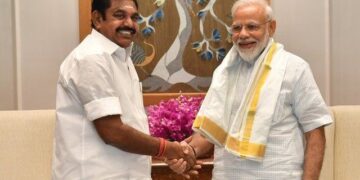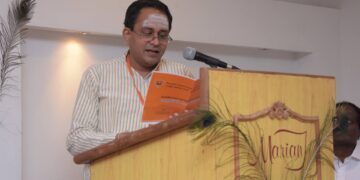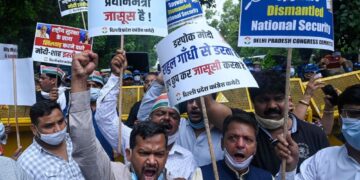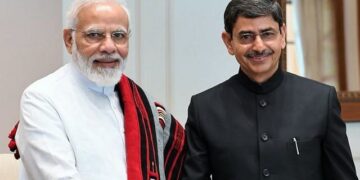 இலங்கையின் முன்னணி ஊடகவியலாளரும் சண்டே லீடர் பத்திரிகையின் முன்னாள் ஆசிரியருமான லசந்த விக்ரமதுங்க உயிரிழந்தமைக்கான காரணம் தொடர்பில் சர்ச்சை எழுந்துள்ளது. துப்பாக்கிச் சூட்டினால் உயிரிழந்தாரா அல்லது தலையில் ஏற்பட்ட காயங்களினால் உயிரிழந்தாரா என்பது குறித்து சர்ச்சைகள் எழுந்துள்ளன.
இலங்கையின் முன்னணி ஊடகவியலாளரும் சண்டே லீடர் பத்திரிகையின் முன்னாள் ஆசிரியருமான லசந்த விக்ரமதுங்க உயிரிழந்தமைக்கான காரணம் தொடர்பில் சர்ச்சை எழுந்துள்ளது. துப்பாக்கிச் சூட்டினால் உயிரிழந்தாரா அல்லது தலையில் ஏற்பட்ட காயங்களினால் உயிரிழந்தாரா என்பது குறித்து சர்ச்சைகள் எழுந்துள்ளன.
சிரேஸ்ட ஊடகவியலாளர் லசந்த விக்ரமதுங்க படுகொலை செய்யப்பட்டு இன்றுடன் ஒரு வருடம் பூர்த்தியாகின்றது.
வைத்தியசாலையில் அனுமதிக்கப்பட்ட போது வைத்தியர்கள் வழங்கிய தகவல்களின் அடிப்படையில் துப்பாக்கிச் சூட்டினால் உயிரிழந்ததாக அறிவிக்கப்பட்டதாக சட்ட வைத்திய அதிகாரி தெரிவித்துள்ளார்.
எவ்வாறெனினும், கூரிய ஆயுதமொன்றினால் லசந்தவின் தலையில் தாக்கப்பட்டதனால் அவர் உயிரிழந்திருக்கக் கூடுமென சட்ட வைத்திய அதிகாரி சந்தேகம் வெளியிட்டுள்ளார்.
இந்தப் படுகொலைச் சம்பவம் தொடர்பில் மிரிஹான காவல்துறையினர் விசாரணை மேற்கொண்டு வந்தன. பின்னர் லசந்தவின் குடும்ப சட்டத்தரணிகளின் வேண்டுகோளுக்கு இணங்க புலனாய்வுப் பிரிவினரிடம் விசாரணைகள் ஒப்படைக்கப்பட்டுள்ளன.
இந்தப் படுகொலைச் சம்பவம் தொடர்பில் துரித கதியில் விசாரணைகளை நடத்தி அறிக்கை சமர்ப்பிக்குமாறு கல்கிஸ்ஸ நீதிமன்றம் உத்தரவு பிறப்பித்துள்ளது.
எனினும், இதுவரை காலமும் இந்தக் கொலைச் சம்பவத்துடன் தொடர்புடையவர் என லசந்த விக்ரமசிங்கவின் கையடக்கத் தொலைபேசியை சம்பவத்திலிருந்து எடுத்திருந்த முச்சக்கர வண்டி சாரதியே கைதுசெய்யப்பட்டு தடுத்துவைக்கப்பட்டுள்ளார்.
இவர் மீது கையடக்கத் தொலைபேசி கைப்பற்றப்பட்ட குற்றச்சாட்டு மாத்திரமே சுமத்தப்பட்டுள்ளது, எனினும், லசந்தவின் கொலைச் சம்பவம் தொடர்பாக இதுவரை எதுவித உரிய விசாரணைகளும் ஆரம்பிக்கப்படவில்லையென சர்வதேச ஊடக அமைப்புக்கள் குற்றஞ்சுமத்தியுள்ளன.
படுகொலைச் சம்பவம் குறித்த வழக்கு விசாரணைகள் எதிர்வரும் 21ம் திகதி மீண்டும் விசாரணைக்கு எடுத்துக்கொள்ளப்படவுள்ளது.











A Statement by the Asian Human Rights Commission (AHRC)
SRI LANKA: Political Patronage for murder and abysmal lawlessness
The first anniversary of the assassination of Lasantha Wickrematunga – 8th January
An assassination in Sri Lanka one year ago became international news and has remained an important item of concern throughout the year. It was the assassination in broad daylight of Lasantha Wickrematunge a well known journalists and editor of a newspaper, the Sunday Leader. The assassination itself and the response of the government, even up to now, on the type of political culture and the nature of the impunity that is prevalent in Sri Lanka.
Several months after the assassination of Lasantha Wickrematunga an unknown young man named Balavarnam Sivakumar was also killed near the coast in Bambilipitya by a group of policemen who pursued him into the sea. This crime which was caught on television cameras also became shocking news and the story has profoundly reflected on the insecurity and the nature of the failure of the government in Sri Lanka.
The two incidents, on the surface are incomparable. The journalist that was killed was one of the best known journalists in Sri Lanka and he was also known internationally. That there were serious threats to the life of Lasantha Wickrematunga was also widely known and the matter was taken up by several media organisations long before his death. Wickrematunga himself was fully aware of the seriousness of the threats to his life and a letter by Wickrematunge published posthumously predicted his death and attributed the blame squarely on the government and the President of Sri Lanka himself.
Balavarnam Sivakumar’s death was of a different kind. A group of policemen who had gone to answer a complaint of someone throwing stones at a train pursued the young man into the sea and beat him with poles to the point where he was drowned. Politically speaking there are no direct links in the two cases. However, at a level of reflection of the type of security problems that has arisen in Sri Lanka both deaths raise similar questions.
The primary issue raised is the type of governance that has become completely irresponsible for the security of persons from murder. In Sri Lanka murdering someone has become an easy job. This has occurred because of the very direct abdication of the responsibility of the government to protect life. Throughout the country there is an atmosphere in which the state has virtually abdicated its duty to protect life.
The state has sunk to this level of abdication mainly for political reasons. The murder of Lasantha Wickrematunge directly reflects the reasons for this abdication. This is to be able to take care of those who are considered enemies of the state or those whom some political leaders consider as their enemies.
That the killing of Lasantha Wickrematunge was a direct result of a political conspiracy involving the highest personalities of the government has been a constant and loud allegation. It has been made by those who were close to Lasantha Wickrematunge, including his professional colleagues. Journalists throughout the world demanded inquiries.
However, the government has refused to inquire into the matter in any credible manner. The government’s very refusal to hold these inquiries itself implicates the government. The strongest argument that the top personalities in the government are complicit in this murder is their very refusal to conduct a credible inquiry into this murder.
The policing system in Sri Lanka still has the capacity to conduct successful inquiries into a murder of this nature. Whenever there were some possibilities of inquiries the Sri Lankan policing service, particularly the Criminal Investigation Division, the CID, has shown a remarkable capacity to investigate such murders. An investigation into the death of a judicial officer, Sarath Ambepitiya, is one such example of a successful inquiry in recent times.
Where there is a deliberate will to investigate such murders, the public cooperation has also been forthcoming as demonstrated in such cases. If there was a competent group of policemen given the task of investigation into this murder without political interference to prevent progress very likely, the public would have provided enormous support for such investigators to resolve this crime. When the public is aware that the investigators themselves do not have any real power to investigate into serious crimes the police do not receive the necessary cooperation to proceed with the investigation.
Very often, the state blames the absence of the cooperation from the public when, in fact, this cooperation is not forthcoming due to public perception that there is serious involvement of the state in hushing up the crime. The people do not want to put themselves at serious risk when they are aware that the murderers have the patronage of the state.
The most serious problem affecting criminal investigations in Sri Lanka is the perception that the state gives its patronage to the assassinations or other forms of harm to political opponents. The regime now in power may claim that they did not invent this tradition and that it existed before it took power. However, such argument only proves the existence of political patronage for murder and the causing of harm on their political opponents.
It is true that this is a tradition that has become entrenched over a considerable period of time. This regime continues that tradition and has even perfected it further. A murder like that of Lasantha Wickrematunga bears witness to this tradition of state patronage regarding assassinations and other forms of harm on opponents of political leaders within the government. Among such opponents is, naturally, the political opposition as well as the media.
This regime considers the media with a tremendous sense of hatred. The hatred against the free media is generated constantly and the agents of the state keep up the atmosphere of threat against the media all the time. It is a deliberately generated sense of threat that is written into the very atmosphere within Sri Lanka.
Every person who comes forward to express a view freely, at the same time expresses fear that his or her life may be under threat. The journalists and others who have been threatened directly are many and almost everyone has acquired psychological habits of developing some form of defense mechanism and undertakes some kind of security measures if they are in any way involved in expressing an idea freely. That is the atmosphere that prevails within the country.
This atmosphere which exists within the capital is felt more strongly in the more distant parts of the country. Naturally, in the north and the east the situation is much worse. It has become a normal pattern of behaviour for Sri Lankans to take measures to safeguard their thoughts and tongues when talking about things which affect their own lives. Everyone cautions the other to be safe in expressing their ideas. This is the normal cultural situation throughout the country.
It is this general atmosphere that is created by the political patronage that gives rise to other murders like those of Balavarnam Sivakumar. In the atmosphere of impunity that is created in the police, the normal way of dealing with the citizens is through violence. Torture and other forms of the use of force take place at all police stations all the time every day.
If the cameras were to be available at all such police stations the films, such as the one of Balavarnam Sivakumar’s assault at the Bambilipitya Sea would be available in all parts of the country. It is not the incidents that are rare but rather the capacity to witness such events and to bring them to the public forum that is difficult due to the very circumstances under which such things take place.
Under such an atmosphere even the judiciary does little to provide protection for the people. At a case at the Negombo High Court the judge held that torture that has been and has been done inside the police station after arrest, cannot be attributed to those who have arrested the person since other police officers may have, in fact, tortured the victim. There has to be cameras everywhere if the actual level of violence that has been taking place within the country through the state agencies is to be brought to a halt.
Thus, the killing of Lasantha Wickrematunge and the refusal of the state to make enquiries is not just about the case of one murder but rather the total culture of impunity that has become so deeply entrenched within Sri Lanka. It can be said without exaggeration that the government continues to maintain patronage for murder regarding its opponents and is therefore responsible for the culture of impunity that is threatening the lives of many people in Sri Lanka.
(For detailed statements on the human rights situation in Sri Lanka please see article 2 and The Phantom Limb)
# # #
About AHRC: The Asian Human Rights Commission is a regional non-governmental organisation monitoring and lobbying human rights issues in Asia. The Hong Kong-based group was founded in 1984.
Source:
AHRC Weekly Digest Subscribe Newletter.
Info by: Alex Eravi
கொன்றது கோத்தபாயே என்ற கொலைகாரன் தான்.
இதைக் காலம் கட்டாயம் உணர்த்தத்தான் போகிறது.
அப்போது உலகம் என்ன செய்யப் போகிறது.
அவனுடைய பண பலத்திற்கு உண்மை அடிமையாகி விடும்.
ஆனால் அவன் உலக மக்களால் வெறி நாயாகத்தான் பார்க்கப் படுவான்.